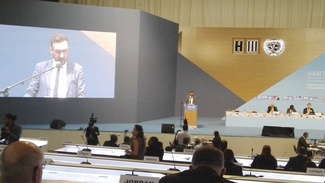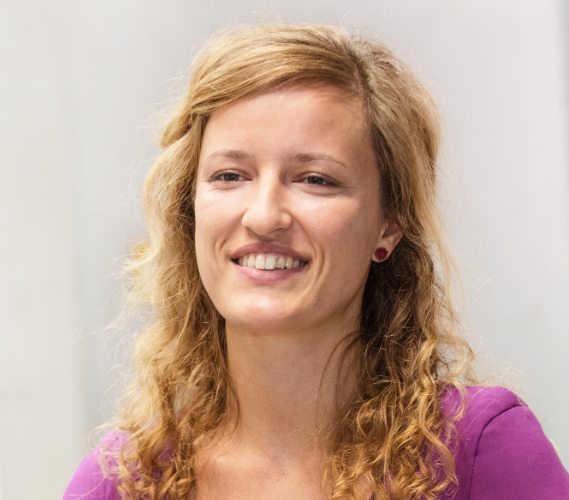- Edito
- De Verenigde Naties gaan een internationale overeenkomst uitwerken voor vluchtelingen en migranten
- De woelige wateren van de Zuid-Chinese Zee
- Opinie - De onderwerping van de Rechtstaat
- Opinie - De Onverenigde Naties
- De EU, België, Vlaanderen en de VN - Plenaire toespraak van Pascal Smet op UN-HABITAT III Conferentie
- Nieuws van de internationale straftribunalen
- Nieuws in het kort
De EU, België, Vlaanderen en de VN - Plenaire toespraak van Pascal Smet op UN-HABITAT III Conferentie
Van 17 tot en met 20 oktober vond in Quito, Peru, de UN-HABITAT III-top plaats, die de prioriteiten voor wereldwijd stedelijk beleid bijstelt. Het resultaat van de top zijn de Quito Papers, een niet-bindend maar universeel akkoord dat productieve, ecologische en inclusieve steden nastreeft.

Pascal Smet tijdens zijn plenaire toespraak op de UN-HABITAT III-top in Quito, 17 oktober 2016 – © www.pascalsmet.be
Ook België was vertegenwoordigd op deze top. Op 17 oktober 2016 sprak Brussels Minister van Transport en Openbare Werken en hoofd van de Belgische delegatie, Pascal Smet, de UN-HABITAT III Conferentie toe. Hij presenteerde er zijn visie voor steden in de toekomst en benadrukte het belang van inclusieve en levendige steden en zijn eigen streven naar een Brussel dat veeleer voor mensen dan voor auto’s moet dienen.
Hieronder vind je de integrale Engelstalige weergave van zijn toespraak.
Mr President,
Distinguished Secretary-General,
Under-secretary,
Ministers,
Excellences,
Dear colleagues,
Ladies and gentlemen,
On behalf of Belgium, I would like to extend our gratitude to Ecuador and the city of Quito for hosting the Habitat III conference. We salute the efforts of all stakeholders, governmental and non-governmental, in the long, sometimes difficult, but eventually fruitful trajectory up to the New Urban Agenda. Belgium welcomes the new urban agenda as an important guideline for the coming years to deal with the further urbanisation of our planet. As an EU member state and host country of the capital of the European Union – Brussels – we of course endorse the statement made by the European Union.
As you know, a couple of months ago, Brussels was the target of a brutal attack of international terrorism on our airport and on our subway. The human loss and tragedy of these events were immense. But the people of Brussels showed what cities are all about. There was sorrow, anger and confusion but very soon our citizens took their life back in to their own hands and sent a clear message: a message of hope, embracing diversity and a true understanding that living together in a city with respect for each other is the only way to proceed. Brussels is a vibrant and diverse city, a lovely place to live, work and raise kids. As a city we will never surrender, as no city should ever do.
Many crucial themes are addressed in the New Urban Agenda. Let me stress four elements that are of particular importance for Belgium.
First of all, cities should be the author of their own future. Only by strengthening the participation of local and regional authorities, ánd of citizens, we can guarantee the strong governance necessary for implementing the New Urban Agenda. All levels of government need to recognize cities as engines of progress, as hubs for creativity, as centers for citizen participation, and as drivers for inclusion. This recognition must be matched by the allocation of the necessary tools to those authorities working at the city level.
Secondly, cities will be inclusive or will not be. At a time of widening gaps between rich and poor, all cities should strive to become more inclusive. “Just cities”, where everybody has an equal opportunity to study, work and live. Where everybody has a home, because homelessness is a shame we should never accept.
Thirdly, cities should be open. The core essence of a city is the interaction between people. People with different opinions, beliefs and orientations. Through this interaction, creativity and innovation is born. Cities should welcome this and also be open to people fleeing human made or climate made disasters and persecutions. But solidarity is necessary between all countries and within all countries to facilitate the integration of newcomers.
Finally, cities should be for people. And no longer for cars. Public space is essential in cities. People should have space to meet, interact and do so without the noice, pollution and stress of cars. The era of the car is coming to an end in cities of the next generation.
Sustainable mobility and accessibility will be at the core of urban planning. The quality of air in cities is essential for their survival. Climate change can also be resolved through good city planning. I therefore praise the New Urban Agenda for making a clear choice to prioritize public transport, walking and cycling, over private motorized transportation.
Ladies and gentlemen,
We are looking forward in working together to work on our New Urban Agenda. It will not be easy, it should be concrete and all UN institutions should embrace this agenda. Life in a city, should be like living a dream. For too many of us it’s still not a dream but harsh reality. Let’s work together to make city-life wonderful for all human beings.
Thank you,
Pascal Smet, Brussels Minister of Mobility and Public Works
 Kirsten Arnauts
Kirsten Arnauts